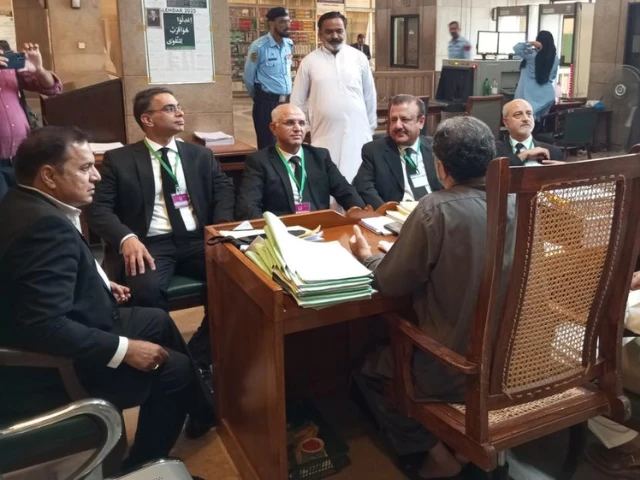IHC judges challenge CJ’s authority on case transfers, judge removals
Five judges approach Supreme Court, filing petitions with 12 separate demands

Five judges of the Islamabad High Court (IHC) have approached the Supreme Court (SC) on Friday, challenging a series of administrative actions by IHC Chief Justice Sarfaraz Dogar, Express News reported.
An unprecedented development has unfolded at the IHC, as Justices Mohsin Akhtar Kayani, Babar Sattar, Tariq Mahmood Jahangiri, Saman Rafat Imtiaz, and Ejaz Ishaq collectively approached SC, filing petitions containing twelve distinct demands.
Their petitions, filed under Article 184(3) of the Constitution, question the limits of the authority of the chief justice, including restrictions on judicial powers, transfers of ongoing cases, and removal of judges from the roster.
In their petitions, the judges raised a point: “Whether the excessive administrative control exercised by the Chief Justice of the Islamabad High Court, impacting judicial outcomes through roster and case fixation, is in violation of the principle of horizontal independence of judiciary?”
Read More: IHC CJ's order stuns legal fraternity
The judges contended that no judge can be barred from performing judicial duties except under Article 209 of the Constitution, and their petitions seek guidance from the apex court on whether the chief justice’s exercise of administrative powers can override judicial functions.
“Whether the Chief Justice of a High Court is vested with any powers that allow him to constitute benches in a manner that renders the judges of the High Court dysfunctional?”, the petitioners questioned.
They questioned whether excessive administrative control, including case fixation and roster management, undermines the independence of high court judges, and whether the chief justice can constitute benches in a manner that renders judges dysfunctional or transfer cases mid-hearing.
The petitions further challenged the continued use of the “Master of the Roster” doctrine, previously nullified by the Supreme Court, and raised concerns about the legality of the administrative committees formed on February 3 and July 15, 2025.
Also Read: Pak-Saudi defence pact poses no threat to any third country: FO
“Whether the invocation of the doctrine of “Master of the Roster” by the Chief Justice of the IHC, already nullified by the Supreme Court, permissible under law?”, the petitions asked the apex court.
The judges argued that powers under Article 202 for promulgating rules must be exercised collectively by the high court, rather than solely by the chief justice, and questioned whether transforming the collegium into a regimented administrative structure violates constitutional principles.
They also highlighted that the publication and belated endorsement of the Islamabad High Court Practice and Procedure Rules, 2025, may be unlawful, and raised doubts about the high court’s failure to establish rules for the functioning of the district judiciary in Islamabad as required under Article 203.
Additionally, the judges sought clarity on whether the IHC can issue writs to itself under Article 199, and whether restraining a high court judge from performing judicial duties contravenes Supreme Court precedents, including the landmark cases of former CJP Iftikhar Muhammad Chaudhry vs President of Pakistan (PLD 2010 SC 61) and Malik Asad Ali vs Federation of Pakistan.
Read More: Dar, Asif hint defence pact could expand beyond Saudi Arabia
The petitions also demand the annulment of administrative committee notifications issued in February and July, and declare the latest IHC rules illegal. They argue that the high court cannot issue writs against itself under Article 199. As they left the Supreme Court, Justice Mohsin Akhtar Kayani told journalists that all cases assigned to fixed benches had been heard.
Reports suggest that Justice Jahangiri may personally represent his case. His petition has been assigned diary number 23409. Justice Jahangiri was suspended from judicial work by the IHC on September 16 over an alleged fake degree case. The suspension will remain in effect until the Supreme Judicial Council (SJC) delivers its verdict.
The petitions were filed amid an unprecedented development at the IHC, which has sent shockwaves through the legal fraternity. Justice Jahangiri has been excluded from the judicial roster for the next three days, following the court’s decision to restrain him from performing any judicial duties until the SJC adjudicates on those allegations.




















COMMENTS
Comments are moderated and generally will be posted if they are on-topic and not abusive.
For more information, please see our Comments FAQ